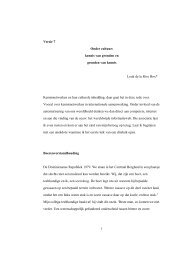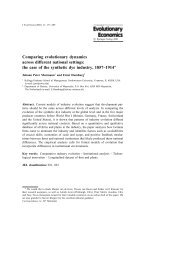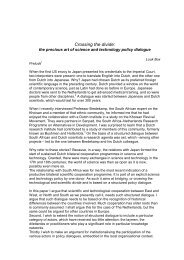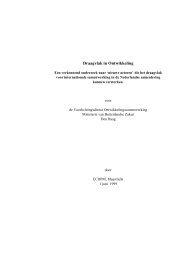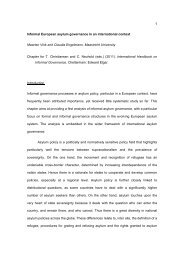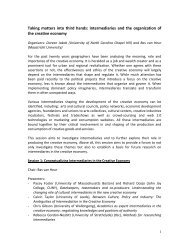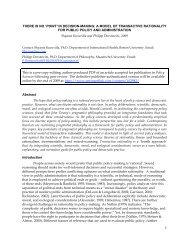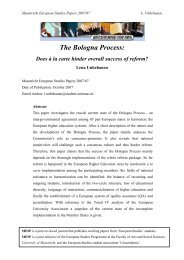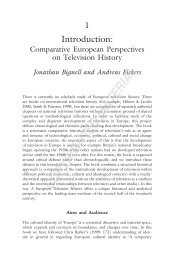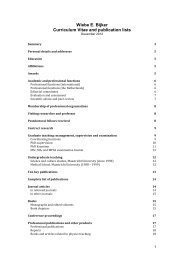Winds of Change: The Europeanization of National Foreign Policy
Winds of Change: The Europeanization of National Foreign Policy
Winds of Change: The Europeanization of National Foreign Policy
You also want an ePaper? Increase the reach of your titles
YUMPU automatically turns print PDFs into web optimized ePapers that Google loves.
Maastricht European Studies Papers 2007/01 Bennet Strang<br />
Originally being only confined to supranational first pillar developments, nobody would have<br />
imagined applying this ‘first pillar concept’ to the second, intergovernmental, pillar (Major/<br />
Pomorska, 2005). Whereas one could also safely conceptualize the increasing<br />
communitarization <strong>of</strong> policy areas in the process <strong>of</strong> European integration by means <strong>of</strong> the<br />
ne<strong>of</strong>unctionalist spillover idea, such thinking seemed to be likewise inconceivable with<br />
regards to second pillar (‘spillover’) developments 26 .<br />
Nonetheless, Mahncke (2004) makes the case for applying the spillover concept to<br />
developments in the intergovernmental domain 27 . <strong>The</strong> exception, however, is that states are<br />
not passively subjected to a ‘drive’ towards increasing integration in foreign policy issues<br />
(ibid.). Thus, there is no automatism, which is in turn suggested by ne<strong>of</strong>unctionalism 28 .<br />
<strong>The</strong>re is, however, a wasteful use <strong>of</strong> this fashionable term <strong>Europeanization</strong> has become<br />
(Torreblanca, 2001), leading to a situation in which the concept in general is expected to<br />
“…explain processes <strong>of</strong> cultural change, new identities formation, policy change,<br />
administrative innovation, and even modernization” (Radaelli, 2000, p. 4). It has to be<br />
inquired whether such a demand does not result in conceptual stretching, arbitrariness and<br />
shallowness. Due to its intergovernmental character, the foreign policy domain in particular<br />
has only seen a rare usage <strong>of</strong> the concept 29 (Featherstone, 2003).<br />
Despite its initially less frequent usage, the very invocation <strong>of</strong> <strong>Europeanization</strong> in<br />
relation with foreign policy “…has reflected the evolution <strong>of</strong> EU foreign policy coordination<br />
itself” (Featherstone, 2003, p. 10). This evolution can be accounted for by the already outlined<br />
ne<strong>of</strong>unctionalist approach and both constructivist and realist theories, which will later be<br />
addressed (Osswald, 2005). <strong>The</strong>re is, in fact, a certain evolutionary process, a ‘Brusselisation’<br />
<strong>of</strong> foreign policy 30 going on. Even “…states jealous <strong>of</strong> their foreign policy sovereignty have<br />
not been immune to…” (Wong, 2005, p. 145) this development. Notwithstanding, it has to be<br />
26<br />
An example would be the development from European Political Cooperation (EPC) to the<br />
increasingly assertive European <strong>Foreign</strong> <strong>Policy</strong> (EFP).<br />
27<br />
One should, nevertheless, acknowledge and keep in mind the pitfalls associated with this<br />
application.<br />
28<br />
In matters <strong>of</strong> foreign policy cooperation, the member states have always chosen and “…choose<br />
which aspects <strong>of</strong> their foreign policy they share, and which they retain” (Manners/ Whitman, 2000, p.<br />
266), with the majority <strong>of</strong> foreign policy issues still being dealt with by them (Mahncke, 2004). As one<br />
might even observe a re-nationalization <strong>of</strong> foreign policy in crises (cf. Iraq War) (Mackenstein/ Marsh,<br />
2005), it becomes even more obvious that the “…EU is far from a single entity that dictates the actions<br />
<strong>of</strong> its member states” (p. 248).<br />
29<br />
As another consequence, “…cases related to EU foreign policy have not figured high in the research<br />
agenda <strong>of</strong> <strong>Europeanization</strong>” (Torreblanca, 2001; Osswald, 2005).<br />
30<br />
<strong>The</strong> impact <strong>of</strong> this ‘Brusselisation’ has uncovered that some Member States’ “…notions <strong>of</strong><br />
specialness and…domain[es] privé[s] are more fluid concepts than was initially thought…” (Manners/<br />
Whitman, 2000, p. 268). This very fact points at the indirect strength <strong>of</strong> <strong>Europeanization</strong> in foreign<br />
policy affairs.<br />
10



